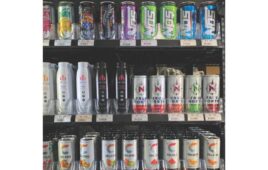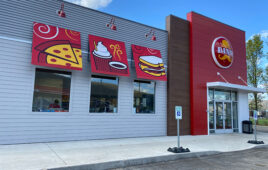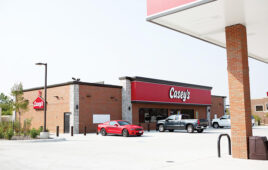Despite the challenges, prepackaged sandwich programs remain big traffic drivers for convenience stores committed to quality.
By Lisa White, Contributing Editor

Some may contend that convenience stores have a love-hate relationship with prepackaged sandwich programs.
There no doubt is profit potential with these products, but overcoming negative perceptions as well as the inevitable shelf life issues can seem daunting for some stores.
“The biggest challenge with a prepackaged sandwich program in the c-store industry is trying to erase the stigma associated with eating food from a gas station,” said Hayley Edenfield, category manager of fresh foods at RaceTrac Petroleum Inc., which operates 660 plus RaceTrac and RaceWay stores in 12 states. “We know there is still that negative connotation with getting a sandwich where you also pump gas.”
However, RaceTrac is determined to change that perception by working with a corporate chef and collaborating with well-known kitchens to take its sandwich program to the next level.
Joe Chiovera is owner of XS Foodservice & Marketing in Lewisville, Texas, a consultancy that provides retailers and manufacturers with holistic solutions to support foodservice at the retail level. A trained chef, Chiovera has worked in the convenience store industry for the last 20 years, including in 7-Eleven’s commissary business and with Sheetz, Exxon Mobil and Circle K.
“Packaged sandwich programs are becoming more acceptable amongst food and retail establishments in the U.S., as has been the case for some time in Europe,” said Chiovera. “We’re finding that even made-to-order foodservice establishments are putting in 8-12 feet of grab-and-go sections. If retailers stick to a core offering, there’s no need for customization, and it’s an acceptable conveyance to consumers.”
SANDWICH TRENDS
Offering the basics should be the starting point for retailers new to the category, as this will help establish credibility with customers.
“The c-stores that are profiting in packaged sandwiches are taking on a good, better, best mentality,” Chiovera said. “It’s necessary to keep the range of product offerings within an acceptable tolerance of the consumer, not going too far off the rim, but yet offering different levels of quality at various price points.”
The challenge is to be aware of limitations, as prepackaged sandwiches are not engineered for extensive shelf life and refrigeration can be bread’s worst enemy.
Chiovera recommended considering the program’s intent and product’s functionality, while paying close attention to formulation decisions.
RaceTrac’s corporate chef researches and develops sandwiches that align with the latest consumer trends. Best sellers include Turkey & Swiss and Chicken Salad.
“The fresh food team works with our commissaries to bring these sandwiches to our guests across all of our regions,” said Edenfield. “Sandwiches, along with our other fresh items, are ordered and delivered to our stores daily.”
Tonawanda, N.Y.-based NOCO Express, a 36-store chain, works with local companies to source its prepackaged sandwich ingredients, including bread and proteins for its popular Buffalo Chicken sandwich.
“We try to create synergies with local companies,” said Jim DeFilippis, NOCO Express vice president and general manager. “For example, one of our local bread companies came up with a spicy roll that we’re using for our Buffalo Chicken sandwich, which also includes hot pepper cheese, blue cheese and hot sauce.”
Another popular item is the Sonoma Chicken Wrap, combining chicken salad with craisins and nuts.
“We promote our Sandwich of the Month, and this one really took off,” said DeFilippis.
The chain produces its prepackaged sandwiches out of its local commissary. In the past, traditional subs were top sellers, but consumers are now seeking healthier options, such as sandwiches made with tortillas or flatbread, as well as smaller, more affordable portions for grab-and-go patrons.
MERCHANDISING MIX
The perishability of prepackaged sandwiches impacts packaging and merchandising options.
For example, certain types of cellophane may increase the risk of condensation and result in soggy bread.
Consequently, choosing the appropriate packaging is key, and it’s not always the most expensive type that works best.
“For example, rigid or clamshells have the most free air, which attacks bread, discolors meat and may cost more than the sandwich without being functional,” said Chiovera.
NOCO Express recently implemented high-density plastic containers that include a flat black base with a shell on top.
“This provides excellent visibility with no condensation issues,” DeFilippis said. “We also can incorporate our Nickel City Foods brand labeling.”
The packaging has been advantageous for the chain’s Nickel City Stacker, a triple decker sandwich with turkey, ham, Swiss cheese, coleslaw and Russian dressing.
In addition to utilizing its own loyalty program, NOCO Express also partners with area businesses’ programs for sandwich specials.
“We like co-branding with other local businesses and marketing in conjunction with these, but also run deals with our loyalty card,” said DeFilippis. “However, we don’t want to discount too much or raise our sandwich prices too high, so instead we strive for value.”
All of RaceTrac’s sandwiches are marketed and merchandised within its sandwich cooler, which is in a central location within its stores.
“Additionally, our sandwich packages were recently revamped to include full nutritional information and a clear window so customers can see what they’re purchasing,” Edenfield said.
For those looking to succeed in the prepackaged sandwich segment, Chiovera recommended looking carefully at the five ‘P’s: production, packaging, price, placement and promotions.
“Placement is huge, because if a c-store is going to hide these products within the store, which many retailers do, it is not doing the category justice,” said Chiovera. “Beverage coolers are not made for foodservice items just as floor merchandisers are not beverage coolers. Placement is important and goes along with packaging and planograms.”
In the case of prepackaged sandwiches, consistency is key. Not only should the most popular varieties be made available, but shelves should remain thick with product.
Sections that are not well-stocked, visible and clean with contrasting sandwich shapes, sizes and colors, are more apt to be overlooked.
BEHIND THE COUNTER
Equipment innovations have helped propel the prepackaged sandwich segment to a broader dimension.
Speed ovens have become more popular for toasting capabilities behind the counter, which provides c-stores with more heat-to-order sandwich options.
“Heat-to-order is becoming more popular in our industry, and what many retailers don’t realize is that hot sandwiches don’t necessarily need to be microwaved,” said Chiovera. “Many times stores purchase speed ovens and don’t use the units to full capacity.”
The success of prepackaged sandwich programs also relies on educating managers about proper ordering and following the correct par levels—the minimum quantity of a given item that a c-store keeps in stock.
“This is why most commissaries fail,” said DeFilippis. “Managers that don’t follow par levels can get into a lot of trouble.”
NOCO Express is continuing to focus on smaller packaging options with its program, which appeals to Millennials and those looking for a quick snack. This also provides lower price points to expand prepared food options.
Also, because it is limited in how much prepackaged sandwiches can be marked up, the chain has created a business within a business by expanding its Nickel City Foods brand to incorporate a catering arm.
“Without the Nickel City Catering business, we couldn’t make money with our commissary, and it also allows us to capture corporate business,” said DeFilippis. “The catering business is up more than 20% from 2015 and also helps us market our c-store Nickel City items.”
In addition, NOCO Express has been able to better control its shrink by improving its packaging and expanding on the variety of sandwiches being offered.
“We didn’t get a return on our program at first,” DeFilippis said. “It took an additional 12-18 months to fine tune it where everyone is on pace with ordering.”
Retailers contend it is a constant learning process, but prepackaged sandwiches are a necessary offering to get customers in the door. Although these products may not be big money makers, this foodservice category is a traffic driver.
“The prepackaged sandwich program at RaceTrac is growing and will continue to grow, as we focus on providing new sandwiches that are on trend with the marketplace,” said Edenfield.




